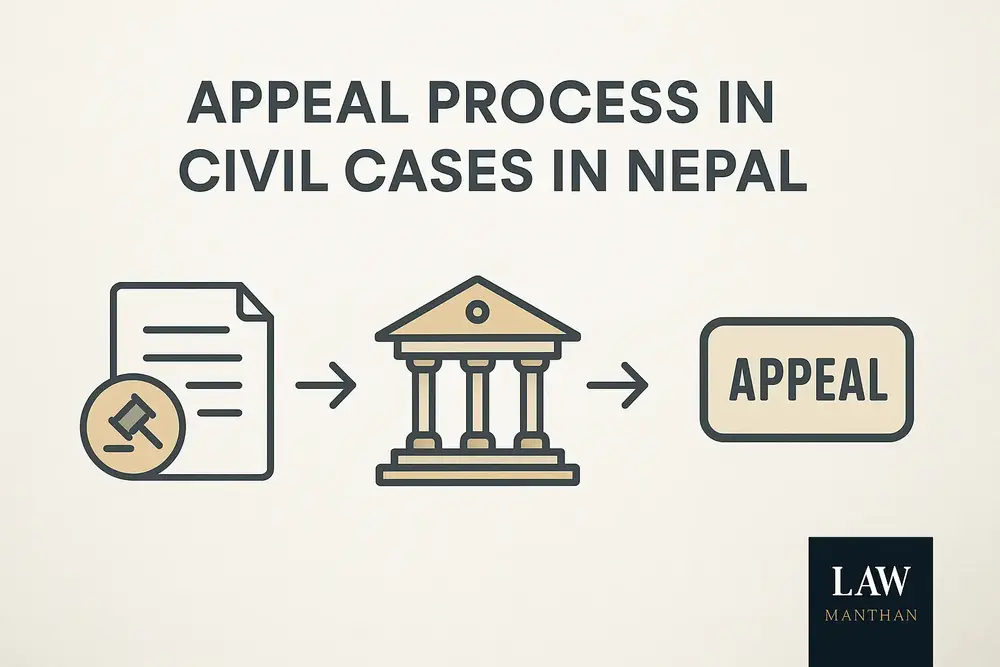Appeal is a legal process where a party requests a higher court to review and reconsider the decision made by a lower court. In simple words, it is asking a senior court to check if the decision of the lower court was correct according to the law and facts. Appeal is not a new trial. It is a careful review of how the lower court handled the case. If mistakes are found in applying the law or understanding the facts, the higher court can change the decision. In Nepal, the right to appeal is a basic part of the justice system, protecting people from unfair decisions and ensuring fairness.
Appeal is not only for the losing party. Even a winning party can appeal if they are not satisfied with some part of the judgment. For example, if a person wins the case but feels the awarded compensation is too low, they can also appeal. Similarly, sometimes government offices and other parties involved in the case also appeal against the decision. Therefore, appeal is a tool available to any party feeling that justice was not completely served.
Laws Governing Appeal
In Nepal, the Civil Procedure Code, 2074 (2017) mainly governs the appeal process in civil cases. It provides detailed provisions regarding when, where, and how an appeal can be made. Other related laws like the Judicial Administration Act, 2073 (2016) and specific subject laws like the Muluki Civil Code, 2074 (2017) also support the appeal system. The Constitution of Nepal, 2072 (2015) has guaranteed the right to justice and fair trial, which includes the right to appeal.
Courts Involved in Appeal
Nepal has a three-tier court system for civil cases:
|
District Court — First instance for civil cases. |
|
High Court — First appeal court. |
|
Supreme Court — Final appellate court under special conditions. |
If someone is dissatisfied with the District Court’s final decision, they can appeal to the High Court. After the High Court’s decision, in some special cases (such as a serious error of law or a matter of public importance), an appeal can be made to the Supreme Court.
Grounds for Appeal
There must be legal reasons. Some common grounds include:
- The court applied the wrong law.
- The court misunderstood or wrongly evaluated the evidence.
- The decision is unfair or unreasonable.
- The procedures followed during the case were not correct.
- Appeal must be based on law and fact, not just on personal dissatisfaction.
Time Limit for Filing Appeal
The time for filing an appeal is very important. According to the Civil Procedure Code, 2074, the general time limit for appealing is 30 days from the date of the decision. If an appeal is not filed within this period, the right to appeal is lost unless there is a strong reason like illness or natural disaster, in which case the party may request an extension showing sufficient cause.
Process of Filing an Appeal
The party who wants to appeal must prepare an Appeal Petition. This petition must clearly state:
- What the errors are in the lower court’s decision.
- Why the decision should be changed.
- What remedy they seek.
- The appeal petition must be filed in the appellate court (usually High Court) along with:
- A copy of the lower court’s decision.
- A certified copy of evidence and documents.
- Necessary court fees.
The appellate court first checks if the appeal is filed properly within the time limit. If everything is fine, the court registers the appeal and starts the appeal proceedings.
Proceedings after Filing Appeal
Once the appeal is registered, the court issues a notice to the opposite party (respondent).
The respondent gets a chance to submit a counter-statement. Both parties may present their legal arguments. However, in appeal proceedings, new evidence is generally not accepted unless it is shown that the evidence could not have been presented earlier even with reasonable efforts.
The appellate court studies:
- The original documents.
- The decisions and records of the lower court.
- The arguments presented by both sides.
- After hearing both sides, the appellate court can take different actions:
- Confirm the lower court’s decision.
- Modify the decision.
- Reverse the decision.
- Send the case back to the lower court for a retrial.
Final Appeal to the Supreme Court
After the High Court’s decision, further appeal to the Supreme Court is possible, but only under limited grounds like:
- The case involves serious legal error.
- The case has public importance.
- The High Court’s decision is clearly unjust.
The Supreme Court does not entertain all appeals. It first examines if the case fits the criteria for a final appeal. Only important cases are admitted. If admitted, the Supreme Court carefully reviews the case and gives its final judgment.
Effect of Appeal
Once an appeal is filed, the execution of the lower court’s decision may be postponed (stayed) until the final decision of the appeal. The party filing the appeal can request the appellate court to issue a stay order to prevent the execution of the judgment until the appeal is decided.
Importance of Appeal System
- The appeal system plays a very important role in civil justice:
- It corrects errors made by lower courts.
- It ensures the fair application of law.
- It protects the rights of the parties.
- It strengthens people’s trust in the judiciary.
- Without appeal, the possibility of injustice would remain high. The existence of appeal ensures that no wrong decision remains uncorrected.
Challenges in Appeal Process
- Although the appeal system is very important, it also faces challenges in Nepal:
- Delay in appeal hearings due to court congestion.
- High legal costs and lawyer fees.
- Complexity of procedures for common people.
- Lack of awareness about appeal rights in rural areas.
The government and the judiciary are working to improve these issues by promoting faster case management and using technology in courts.
Conclusion
In Nepal, the appeal process in civil cases is a fundamental pillar of justice. It provides an opportunity to correct mistakes and ensures that everyone gets a fair chance. Every party to a case has the right to appeal if they are not fully satisfied, not just the losing side. Appeal gives strength to the principle that justice must not only be done but must be seen to be done.Proper use of appeal rights and timely filing with clear legal grounds can make a big difference in achieving justice.




